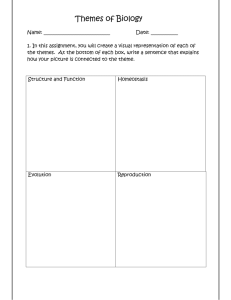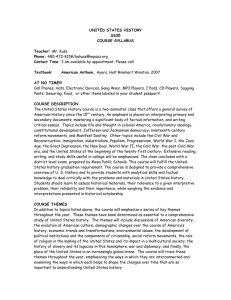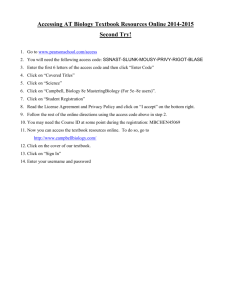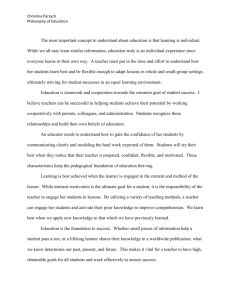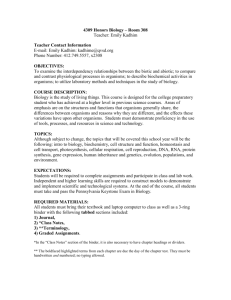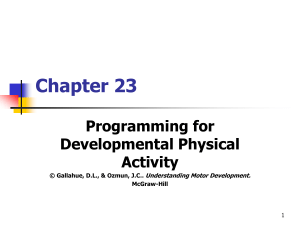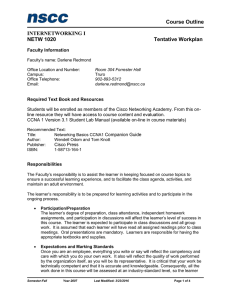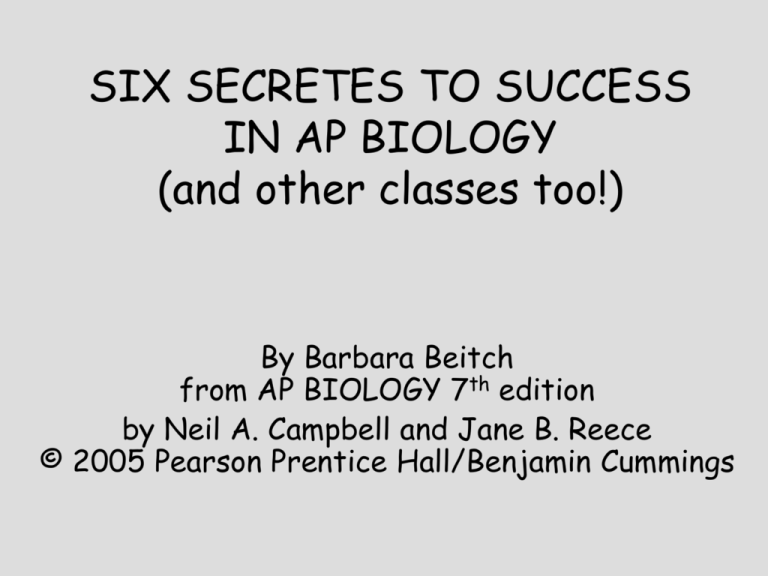
SIX SECRETES TO SUCCESS
IN AP BIOLOGY
(and other classes too!)
By Barbara Beitch
from AP BIOLOGY 7th edition
by Neil A. Campbell and Jane B. Reece
© 2005 Pearson Prentice Hall/Benjamin Cummings
Be an active learner IN class
•Showing up is not enough.
•Don’t sit passively in class and
just “take notes”.
•Think critically
•ASK QUESTIONS
•Participate in labs and activities
Be an active learner OUTSIDE class
There is a correlation between academic
success and study time BUT . . .
it is QUALITY not QUANTITY that matters!
•Teach someone else
•Find students you are compatible with and
form a study group
•Avoid “host-parasite” interactions
• Working with a study group doesn’t mean
“group answers” !
DO YOUR OWN WORK!
Be an active learner OUTSIDE class
•Create your own test questions
•Include 5 plausible answers
•Make correct answer the same length as the
distractors.
•Avoid: all of the above, always, and never
•“Facts” are important, but also look for
major themes and connections
•Try to make connections by integrating
different topics into some ?’s
•Include some “Compare and Contrast” ?’s
•Then write out answers and verify with book
USE YOUR RESOURCES
•Use Concept Headings in chapters to help
you organize
•Complete ?’s at end of chapter (even if not
assigned) and check answers in back of book
•Use CD and online textbook to review
concepts and quiz yourself
•Use Activities, flash cards, and other review
tools on your CD and online textbook
•Don’t skip over figures and tables in chapter
•Other AP review resources can be purchased
Don’t rely on memorization!
• Yes, vocab is important
(You need it to communicate what you understand)
BUT . . . DON’T STOP THERE!
•Integrate the terms you know into
“BIGGER IDEAS”
•Tie concepts together with each other and
to the THEMES
•SEE THE BIG PICTURE
EVERYTHING IS CONNECTED!
Hone your time management skills
•Strive for a balance juggling classes,
extracurriculars, work, and relaxing time
•MAKE A SCHEDULE
including study time and due dates
•AP assignments are more open ended
You must keep up with the reading AND plan time for long
range assignments such as lab reports
•Be responsible for your own independent
study requirements
(You know what topics need refreshing)
MAKE CONNECTIONS. . .
Relate what you learn to real world
• Connect topics discussed in class to what
you hear on the news
Practice making connections helps when you
encounter unfamiliar ?’s on AP Exam
•Learning to recognize themes can help you
make connections

